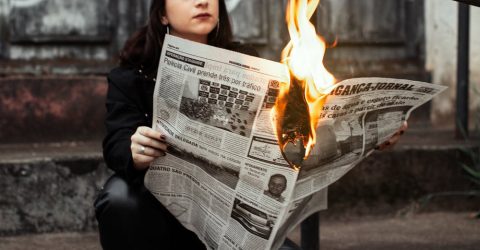How to read the news
In a world of fake news and online conspiracy theories, knowing fact from fiction is more important than ever!

As the Trump presidency ends, the impact of ‘fake news’ is more obvious than ever. We entered 2021 with violent, conspiracy theory media fueled protests at the end of Trump’s White House tenancy. We spent most of 2020 arguing with ‘anti-maskers’ and ‘anti-vaxxers’. And let’s not get started on QAnon. So it’s certainly safe to say that you can’t believe half the stuff you read online.
Of course, it’s not for anyone to say what you should or shouldn’t believe in. But you should know the facts about what you care about before you get too invested. Here are our top tips for spotting fake news a mile off:
Check yourself.
Do you think you know all the facts about something when you read the news from one newspaper? If so you might have a biased perspective. Ask why you prefer to believe one truth over another reported elsewhere.
Fake news!
Where are you getting your news from? If you’re getting your news about rabbits from ‘www.ihaterabbits.com’ then you’re clearly going to get a skewed take. The same goes for any news issue, some outlets have vested interests in covering issues positively or negatively.
Check your sources’ sources.
Who pays the person you’re getting your information from? In the 1950’s tobacco companies paid doctors to say that smoking wasn’t dangerous for your health. That’s after it had been scientifically proven! So if dodgy doctors can take money for fake news, so can dodgy journalists or news outlets.
Who does this benefit?
Much like the last two points, this one is a matter of thinking about the issue you’re reading about. If there’s a war and you’re reading news from a country committing war crimes it will benefit them to lie.
Headlines can be misleading.
Headlines are designed to grab your attention by exaggerating a story. Some people ‘skim the headlines’ and call it reading the news. Complex world affairs can’t be summaries in 10 words or less. It takes your workmate 4 Instagram stories to explain how they cooked their tea.
MoreHow to stay safe on Social Media
Words can be misleading.
If headline’s can be misleading, you would assume the article itself would be a little more black and white. Especially if it’s in a newspaper, get it? Sorry.
Journalists can use words which have different meanings to different people. For example, a news story says there was a ‘heavy police presence’. You could consider it a more or less dangerous situation. It all depends on your personal experience with the police. If they routinely stop you because of racial profiling or because of your age, you might be less trusting. Your own life experience brings meaning to words.
Format can be misleading!
Media companies and advertisers are finding sneakier ways to sell you products or ideas. Be it fake news articles, or an Instagram advert designed to look like another post from an influencer. You’re more likely to engage with content on social media because it’s short and sweet. If it blends in with photos from your friends you’re more likely to have positive associations with it.
Get out of your bubble.
Speaking of friends, do you see the same news stories shared by the same people. Have you muted people you disagree with? The algorithm in social media that sorts out what content you see has a big effect on your media knowledge. If the algorithm sees 20 of your friends like cakes but only 5 like biscuits, you’ll only ever see cakes. Neither would be good for a diet.
Think before you share fake news.
Are you sharing an article about climate change because you think it will change someone’s mind? Are you 100% certain that it’s all true? Did you check the sources before you shared fake news?
And most importantly, don’t get your news from social media.
Your mum’s best friend’s husband did not ‘catch COVID off a wi-fi hotspot’. He doesn’t have a degree in biology or physics. He is an estate agent. And he only had a sore throat. Fake news!






